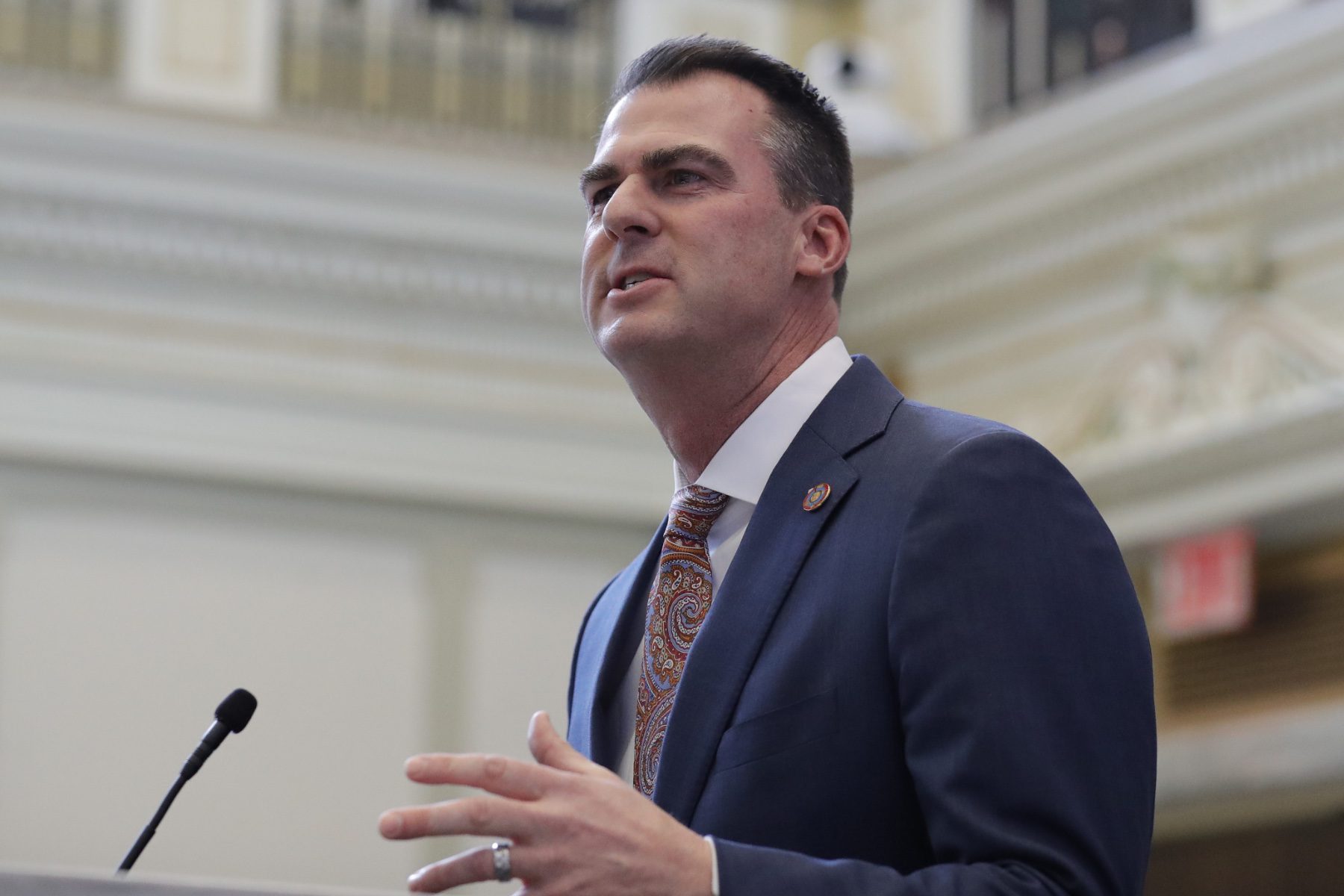Oklahoma Gov. Kevin Stitt signed a law Tuesday criminalizing all abortions with narrow exceptions to save the pregnant person’s life. Under the law, medical providers who perform abortions could be punished with up to 10 years in prison.
“We want Oklahoma to be the most pro-life state in the country,” Stitt said at the bill signing. “We want to outlaw abortion in the state of Oklahoma.”
The ban will take effect 90 days after the state’s legislative session ends, putting it on track for enforcement by the end of August. The ban is similar to laws passed last year in Arkansas and in Alabama in 2019, both of which have been blocked from going into effect by courts.
Stitt recognized on Tuesday that the law will likely be challenged immediately. And that could be why, despite a total ban on abortion going into effect imminently, a slew of abortion restrictions are still making their way through the Oklahoma legislature. As statehouses across the country rush to pass new abortion restrictions ahead of a consequential Supreme Court ruling this summer, Oklahoma lawmakers are trying to restrict abortion access by any and all means necessary.
“Oklahoma is passing every type of abortion ban to give themselves the largest chance possible for one of them to go into effect. They may be essentially hedging their bets,” said Elizabeth Nash, who tracks state policy for the Guttmacher Institute.
With its decision in Dobbs v. Jackson Women’s Health Organization this summer, the Supreme Court is expected to weaken or eliminate the federal abortion protections established in 1973 under the landmark Roe v. Wade case. Still, so much of what states will be allowed to restrict is dependent on the particulars of how the Dobbs ruling is written. And experts see moves like Oklahoma’s — attempting to pass a wide variety of different but seemingly overlapping bans — as a way to make sure one will stick.
If any of Oklahoma’s bills take effect, the impact would be tremendous. After Texas implemented its six-week abortion ban this past September, Oklahoma has become a haven for people seeking to terminate their pregnancies. Since September, about 1,400 Texans have left the state each month for an abortion, per data collected by the Texas Policy Evaluation Project. Almost half — 45 percent — went to Oklahoma.
-
More from The 19th
- Supreme Court’s upcoming abortion ruling will spark a new round of questions about legality and access
- Medication abortions — the most common method of ending a pregnancy — are growing significantly more expensive
- Oklahoma was key to abortion access for Texans. Now, the state could ban the procedure entirely.
“This is covering all their bases, giving them the largest chance for an abortion ban to go into effect. They’re continuing down this path this year because they’re trying to read the tea leaves of the Supreme Court,” Nash said.
A state committee voted last week to move forward on a bill that would emulate the six-week abortion ban currently in effect in Texas, which uses private lawsuits for enforcement. That bill now awaits a floor vote in the House. If signed by the governor, it would take effect immediately.
And on Monday, a Senate committee voted in favor of another Texas-inspired abortion ban. Instead of ending abortion access after six weeks, it would allow for civil litigation against people who “aid or abet” the provision of any abortion at any gestational age, with exceptions for rape and incest. If passed by the full Senate, it would also go to the governor’s desk – and also take effect right away. In that event, clinics are expected to stop providing any abortions in the state.
Both the Texas-inspired abortion bans being floated have the votes to pass, and it’s not entirely clear yet which one the legislature will choose to advance. But both are expected to move forward, despite the total ban — which likely can only be enforced if the Supreme Court uses the Dobbs decision this summer to overturn Roe — taking effect in August.
Abortion providers in Oklahoma expect that last bill, House Bill 4327, could be passed as early as next week, and it’s the restriction they are most concerned about.
The threat of those bans has already limited access to abortions. So far, Trust Women, an abortion provider with clinics in Oklahoma and Kansas, has not scheduled any abortions in Oklahoma this month. At Planned Parenthood, staffers are in some cases encouraging patients to consider making appointments in Kansas and Arkansas — just in case, by the time a patient comes in for care, their abortion is no longer legal.
“We are in the position now of having to go day by day,” said Emily Wales, interim president and CEO for Planned Parenthood Great Plains, which serves Oklahoma, Kansas and Missouri.
Aside from hedging their bets with legislation, for many Republican state lawmakers, leading on anti-abortion legislation appears to be a critical winning issue — especially with midterm elections only months away.
“This is an opportunity for anti-choice politicians to profit, to secure their elections,” said Myfanwy Jensen-Fellows, director of advocacy for Trust Women. “What we’re seeing is an overarching wave of any attacks that they can on abortion care — to see what sticks as well as trying to make a name for themsleves.”
It’s not yet clear which abortion bans would withstand courts’ scrutiny. Texas’ six-week ban — the first active abortion law to rely on civil litigation instead of criminal penalties — has survived legal challenges in federal court as well as the Texas State Supreme Court, thanks to its roundabout enforcement structure. No court has stepped in to block the law, even though it appears to defy the Roe v. Wade protections.
Individual state courts may be different. In Idaho, the first state to pass a Texas-inspired ban, Planned Parenthood has challenged the ban in state court, suggesting it violates Idaho’s constitutional protections. While the legal challenge ensues, the state’s Supreme Court has blocked the law from taking effect. Both Idaho’s governor and attorney general also suggested that the ban could violate their state constitution.
Even the total ban signed Tuesday could face legal challenges. Oklahoma’s state Supreme Court has previously ruled to block state abortion restrictions. But those rulings have cited federal abortion rights protections.
If Roe is overturned or weakened, it’s not clear the state courts would step in to block new abortion bans.Oklahoma’s state constitution does guarantee a right to privacy — a provision many reproductive rights lawyers and scholars have argued implies an abortion rights protection and that could be cited in challenges to one or any of these bans. In both Florida and Montana, the state’s Supreme Court has held that the right to privacy includes an abortion rights protection.
But the legislature is also advancing a measure that would ask voters to amend Oklahoma’s constitution, so that it explicitly does not protect abortion rights. That measure was approved by the Senate last month. If passed by the House, the amendment would be put before voters this November.
“Legislators are determined to pass abortion bans and the state courts and constitution are not seen as a barrier, especially as more states are looking to amend their constitutions to restrict abortion rights,” Nash said.
That strategy has already worked in some states. In Louisiana, voters recently amended the constitution so that it explicitly does not protect abortion rights.
Already, abortion access in Oklahoma is tenuous. Clinics in neighboring states too are strained for resources, as thousands of Texans leave their home state for care. Trust Women’s Oklahoma clinic now sees mostly patients from Texas. Its Kansas clinic too is treating a majority of people from out-of-state: Texans and also Oklahomans who can no longer get an appointment in their home state.
“Oklahomans are frustrated. They’re frustrated about why it’s hard to get appointments already,” said Emily Wales, chief operations officer for Planned Parenthood Great Plains, which serves Oklahoma, Kansas and Missouri. “The patients we see from Texas are generally exhausted. They don’t understand why they may live from a Planned Parenthood 15 or 20 minutes away from home and couldn’t get care.”
The surge has meant clinics are overwhelmed, and patients seeking abortions face wait times of at least two weeks. Many are traveling hundreds of miles for care, using grocery and rent money to pay for the journey. If Oklahoma bans most or all abortions, that would futher displace thousands of Texans and Okahomans — many of whom have already faced weeks-long delays in accessing abortions. The next closest sites for care are in Colorado, New Mexico and Arkansas, where clinicians say they are similarly overwhelmed.
“This is not just going to affect the patients of Texas who are traveling to Oklahoma, but every Oklahoma patient, and patients in the surrounding area that traveled to Oklahoma at baseline,” Dr. Kristina Toccee, medical director for Planned Parenthood of the Rocky Mountains, recently told The 19th. “Everyone gets displaced and affected by this.”







